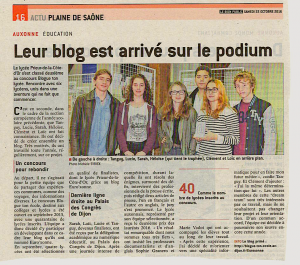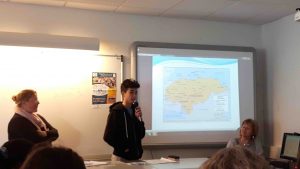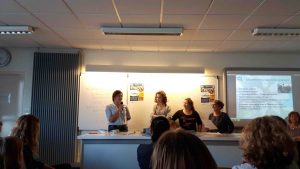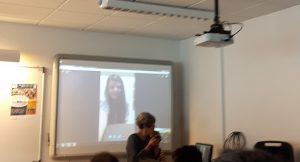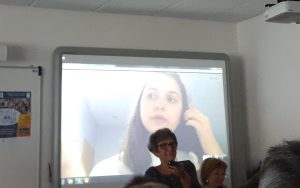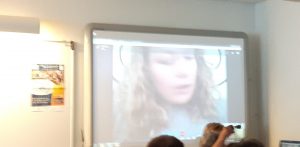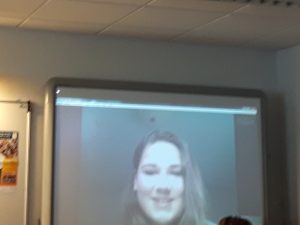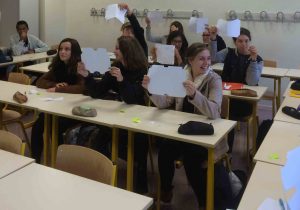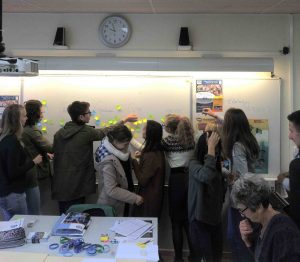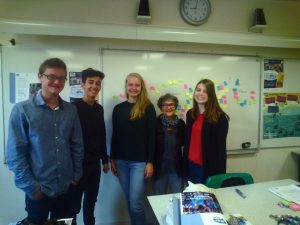Here is an interview done by Sarah (from the DreamTeam) who is participating to a project about school in Europe. (by the way, if you are studying or teaching at the Lycée Prieur de la Côte d’Or, you will soon find an exhibition about it in the CDI !) So, Sarah interviewed her pen friend Helen from England and shares her answers with you :
First, can you roughly introduce your high school ?
My school is called Guildford High School, in an area called Surrey. It is an all-girls private school, and you can go to the school from when you’re 5 years old to when you’re 18 ! (I started this school when I was 11)
How is it organised ? With a headmaster, teachers, supervisors…?
There are separate buildings for students aged 5-11, 11-16, and 17-18, and different teachers for the Junior School (ages 5-11) and Senior School (ages 11-18). We have a headmaster for the Junior School, and a headmistress for the Senior School. There is a teacher who is in charge for each subject, for example, we have a ‘Head of Music’, and 3 other teachers who also teach music. We also have teachers to help us with specific things that are not in lessons, for example entry into university, jobs, etc.
What about the job pathways, classes, options ?
As I mentioned, we have a teacher to help us if we have questions about university applications, what job would be right for us, things like that. For the first three years of Senior School, we study all subjects, but when we are in Year 9 (age 14), we have to study sciences, Maths, English, at least one language, and one humanities subject (Religion/Geography/History), but otherwise we can choose the other subjects we want to study for the next two years, choosing a maximum of 11 subjects. I studied Physics, Chemistry, Biology, Maths (with Additional Maths), English Language, English Literature, French, Spanish, Latin, Religion, and Food Technology. The number of people in each of our classes at this point is about 20. At the end of these two years we take exams called GCSEs during the summer. After that, we have to choose 4 subjects to study for the next two years, and these subjects should be relevant to what we want to do at university. I have chosen to study Physics, Chemistry, Biology and Maths, with Portuguese as an extra course, since I would like to study sciences with a language at university. During these two years, the number of people in our classes is much smaller, so I have roughly 8 people in each class, making the teaching a lot more personalised.
What is the marking like ?
I think the marking of our work is very different depending on the teacher ! Our grades can be A* (the highest), A, B, C, D, E, and U (the lowest). Some teachers want everything to be perfect to get an A*, but some teachers don’t – it depends !!
What about your exams ?
When we’re 16 we have GCSE exams, as I said, and then we go on to choose our 4 subjects to study for ‘A Level’. After one year we take some exams (called AS exams) in our 4 subjects, and at the end of this year, most people drop a subject, leaving them with 3 subjects each. We then take exams again (called A2 exams) in these 3 subjects when we’re 18, and these are the grades that are most important for applying to university. After applying to a university, if the university wants to offer you a place, they will tell you the exam results to need to get to still be able to go there. For example, if I were applying to study physics at university, I might need an A* grade in physics or maths, then two more A grades. This is basically to prove you’re a good student and can do well in your exams, so then the university can offer you a place.
How do you go to school ? Are there students in your high school that take the bus ?
I cycle to school every day (it is about 6 kilometres from my house to school), and it’s great exercise, although sometimes it’s a bit cold !! However, hardly any other students cycle to school. A lot of the people who live far away take the train, and some students go by car with their parents, or they can drive themselves, if they’re old enough. There are a few students who walk, but only if they live very near school, and a few take the bus (we don’t have a school bus, they just take a normal bus), but really not many.
When are your school holidays ?
We have 3 long holidays, at Christmas (2 weeks), Easter (3 weeks), and Summer (8 weeks), and 3 short holidays in the middle of each school term, which are 1 week.
What do you think about school uniforms ?
We only have to wear school uniforms until we are 16, and I think the uniforms at our school are not too bad ! We have a stripy shirt, a dark blue skirt, jumper, and blazer, and we can either wear socks or tights. I think in comparison to a lot of other schools, our uniform is nice, and I like that we don’t have to wear ties ! I don’t think skirts are very practical for me because I cycle to school, but most people like them.
Which sports do you do at school ?
From ages 11-14, we have 2 sports lessons each week, and we have to play lacrosse and netball for the first two terms, and then we do athletics (discus, running, shotput, long jump, etc) in the summer. In our other sports lesson we do swimming or dance or gym. We also have the choice to go to clubs for extra practice at these sports, or other sports. There are a lot of different teams, so if you’re good enough you can play these sports more seriously for a team, and do competitions. However, when we’re older than 14, there is a lot more choice for sports, especially in years 12 and 13. For example right now I am doing yoga in my sports lesson, and I’ve also done ice skating, and had the option to do zumba, swimming, trampolining, squash, golf, and some other things.
Which languages do English people learn (generally) and from which age ?
It depends on the school as to which language we learn, but most schools teach basic French or Spanish from about age 8, and I remember at my infant school (ages 5-7) I went to French Club, which was optional, but we just learnt basic colours, greetings etc. At the school I went to, I just learnt French from age 8, but the teaching was not so good, so I can’t remember anything I learnt ! At my school now, we choose two languages to learn for 3 years, out of French, Spanish, and German, and then for GCSE we can choose which languages we want to continue. We also learn Latin at my school, and we have the option of learning Greek when we’re older, but these are not such common languages to learn in England !!
Do you have assistants from other countries ?
For GCSE, we have language assistants in each language, and once a week we have ‘conversation lessons’, where we just spend 30 minutes talking in a group with the language assistant. I think it’s great to have language assistants, especially if normal classes are very big, because it means you get more of a chance to speak. However, I think most students don’t make the most of this opportunity, as a lot of them don’t want to speak at all, and the conversation lessons are quite short.
Do you go on school trips ?
From years 7-11, we have more school trips than we do in years 12 and 13. When everybody studies the same subjects, it’s easier to get a lot of students to go on one trip, so I think that’s why there are more school trips when we’re younger. For example in years 8 and 9 we went to France twice, once to Versailles, and once to Lille. In year 7 our first trip was ‘Bushcraft’, which was camping in a forest, and making fires and cooking our own food, just to live outside for 2 days ! There are some school trips which was optional, and usually they are a bit more expensive, but they are longer trips. So for example 2 years ago I went to Italy for a week, and we visited places like Rome and the Amalfi Coast, and ate so much ice cream !! Now, since we only study 4 subject each, there are fewer trips, but the ones we do go on are important, for example if the geography students needed to gather data for a case study.
What kind of relationships do students have with teachers ? Do you laugh with them for example ?
When we’re younger, I think the relationship between students and teachers is a lot more formal, as there are many more students in each class, so each student can’t get personal attention from the teacher. However, when we’re older, especially in years 12 and 13, we can only have a maximum of 12 people in each class, and most of my classes only have about 7 people, so we get a lot more time to talk to the teachers. I also think because the teachers are teaching their subject at a higher level, we can ask a lot more interesting questions, and the class can be closer as a group of friends, because every student chose to study that subject because they love it, not because they have to. So when we get older, we laugh and make a lot more jokes with our teachers.
Do you have breaks ?
We technically have 3 breaks in the school day, but one is the ‘5 minute break’, but we almost never have those 5 minutes as a break, because it usually takes 5 minutes to walk to the next class !! We have a break for 20 minutes at 11:45, and lunch is from 13:25-14:30, which I think is quite late. I usually eat my lunch in about 15 minutes, and the rest of my lunch break is spent at a club, like orchestra or choir, so I don’t get to completely relax, but at least I’m doing music, which is different to classes !
How is the life there ? What do you think about your high school ?
I love my school, and I think there are great relationships between students and teachers, and there is a strong sense of community. All the students love to learn and that’s why the whole school community works.
Wow! You did it! Thanks for reading everything and enjoy your day! 😀
#Sarah #DreamTeamForever
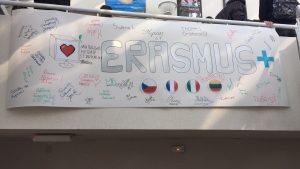 also gives us the opportunity to travel and to make friends from abroad, even if this project was just in Europe, it opened up our minds to the rest fo the world ! This experience has opened our minds since we have learnt how to work together. We will never forget it!
also gives us the opportunity to travel and to make friends from abroad, even if this project was just in Europe, it opened up our minds to the rest fo the world ! This experience has opened our minds since we have learnt how to work together. We will never forget it!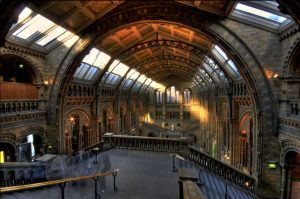 to make us guess which animal it was. It was very funny !
to make us guess which animal it was. It was very funny !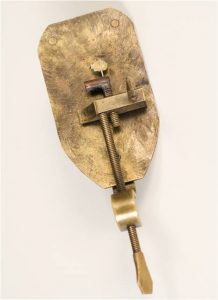
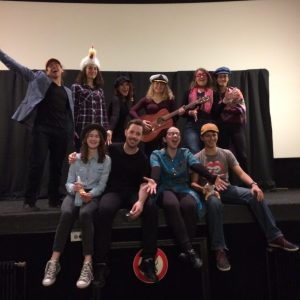 #DreamTeam
#DreamTeam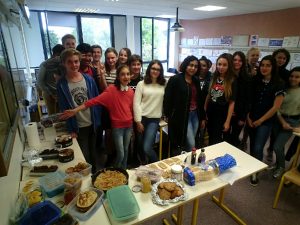 h pupil prepared at home a British, American or even Canadian recipe and we had to explain what we cooked, baked or grilled. That was a great moment because we could taste lots of specialities !
h pupil prepared at home a British, American or even Canadian recipe and we had to explain what we cooked, baked or grilled. That was a great moment because we could taste lots of specialities !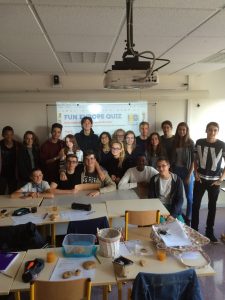 had fun mixing American and British specialities : for example we tasted scones with peanut butter and pancakes with lemon curd!
had fun mixing American and British specialities : for example we tasted scones with peanut butter and pancakes with lemon curd!